Tuesday Triage #61
- TUESDAY TRIAGE #61 by Vadim Drobinin
- On never-ending summer
- Things I enjoyed reading
- 1. Eleven Madison Park Isn’t Ready to Be a World-Class Vegan Restaurant by Ryan Sutton
- 2. How doctors die. It’s not like the rest of us, but it should be by Ken Murray
- 3. Interview with Sebastiaan de With by @theloversmag
- 4. Facebook on your face by @alexeheath
- 5. My Life After Quitting Social Media by @durmonski
- 6. Why the world still loves 1970s detective show Columbo by Shaun Curran
- 7. How I accidentally deleted your Apple Shortcuts by @fransrosen
- 8. No laughing matter? What the Romans found funny by Orlando Gibbs
- 9. Why Don’t the French Celebrate Lafayette? by @adamgopnik
- 10. How to Survive the End of the Universe (In 7 Steps) by Don Foley and Michio Kaku
- Things I didn't know last Tuesday
- 1. Don't pre-rinse for dishwasher
- 2. Keyhole imaging technique
- 3. Pasta Inflation
- 4. Much greater than
- 5. Weight loss to solve Global Warming
- 6. Gas stations don’t make money from selling gas
- 7. Ribena fined for misleading vitamin C claims
- 8. The most dangerous cosmetic surgery
- 9. Why do anime characters yell their names and attacks
- 10. Leaves on the Line
- Book of the week
- Thank you and see you in a week!
TUESDAY TRIAGE #61
by Vadim Drobinin ¶
Your weekly crème de la crème of the Internet is here!
14.09.2021 (read in browser)
-
Intro
Whatever is on my mind this week. -
Things I enjoyed reading
Ten-ish articles I found worth reading. -
Things I didn't know last Tuesday
Ten-ish facts I didn't know when I wrote the previous edition. -
Book of the week
Some thoughts on the latest book I've read.
On never-ending summer ¶
This year three months of summer seem to stretch through September as well.
It's hard to tell whether we already have an early Indian Summer, or it's just the global warming being more prominent.
That being said, I am still rather against any air temperatures that can melt butter, but despite spending most of the time behind shades, over the weekend we went to Kew Gardens, which is like a zoo but for odd plants from all over the world.

The rest of time was spent researching and working through eclair recipes.
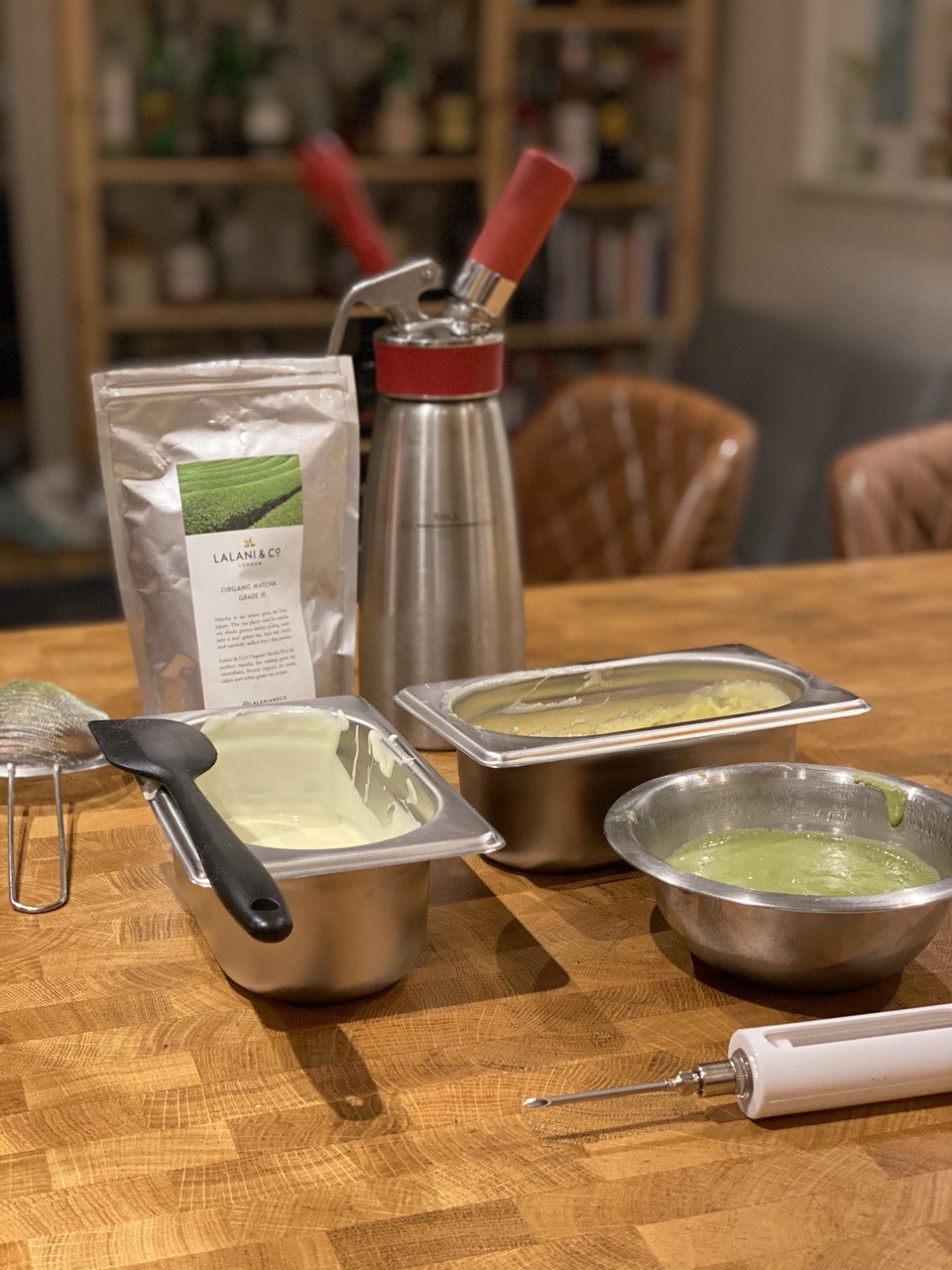
I never did them before, and it always felt like something rather arduous, given the variety of fillings, doughs, and glazes. I ended up with a dozen or so of shells that were decent enough to eat, and then made three different types of eclairs.
The first and probably my most favourite is Lychee-Greek Yogurt.
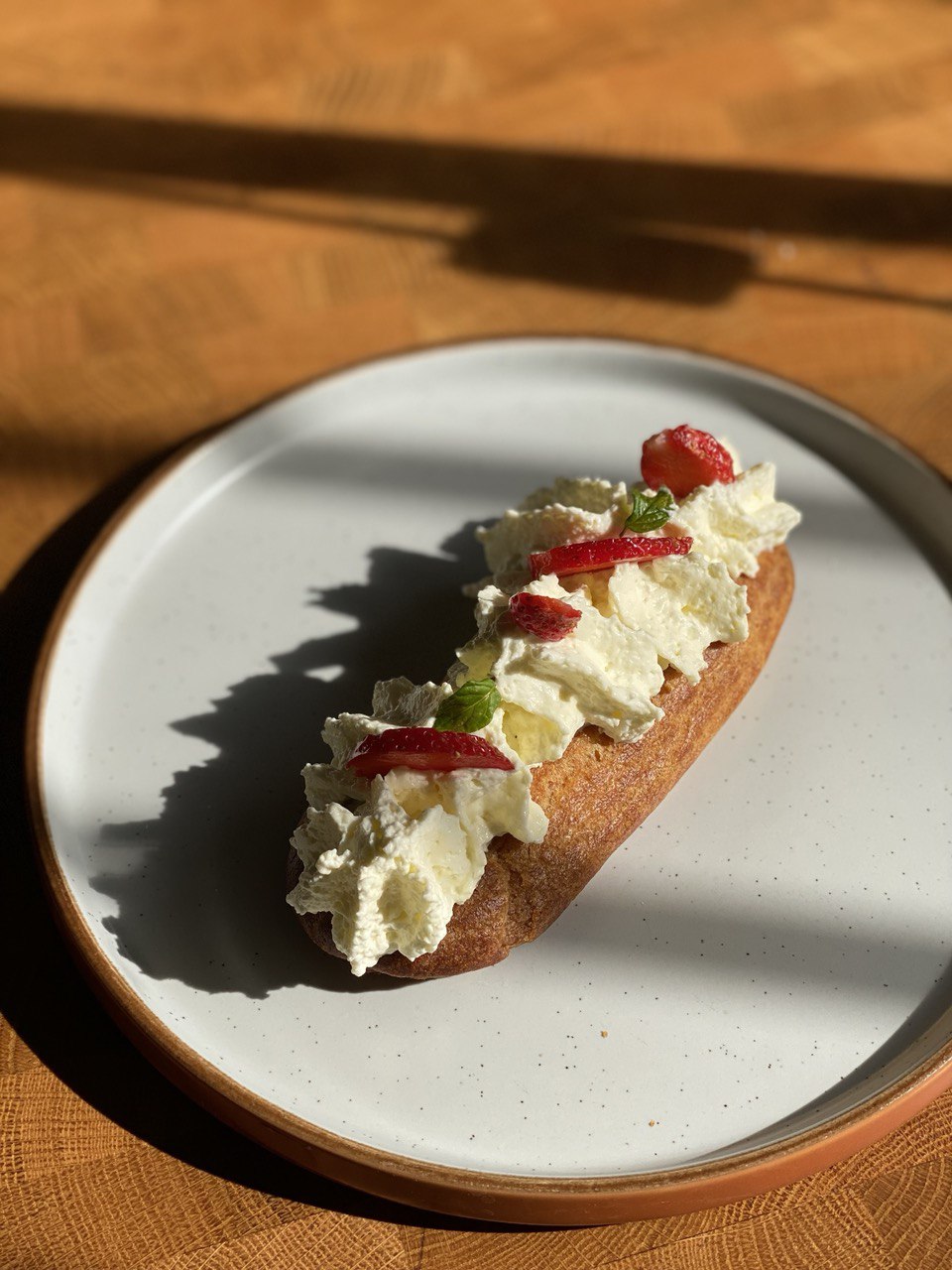
Greek Yogurt brings up a bit of sourness, while lychee is not overwhelmengly sweet. It's garnished with fresh strawberries and straweberry mint from our garden.
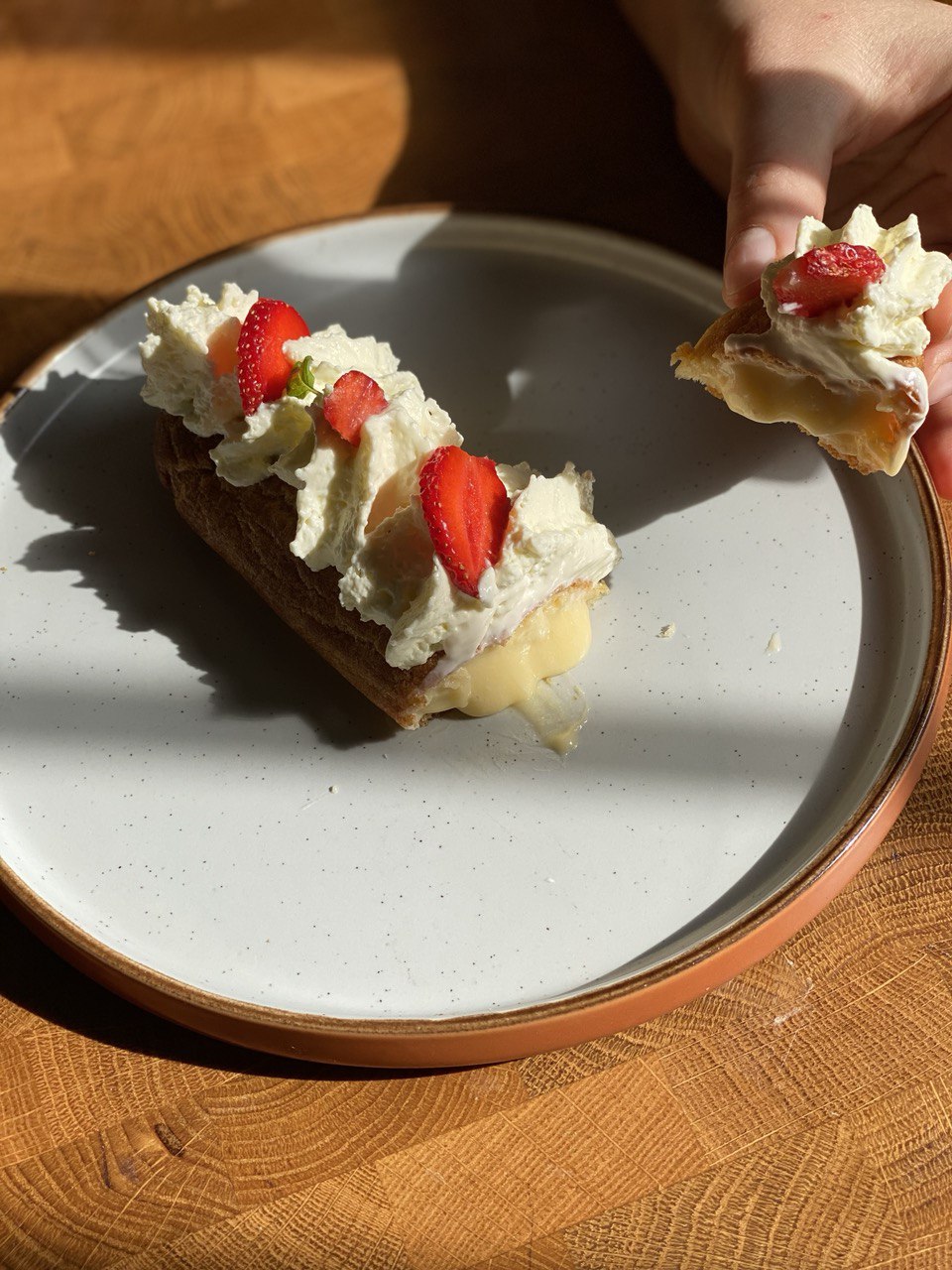
Another one is Match-White chocolate.
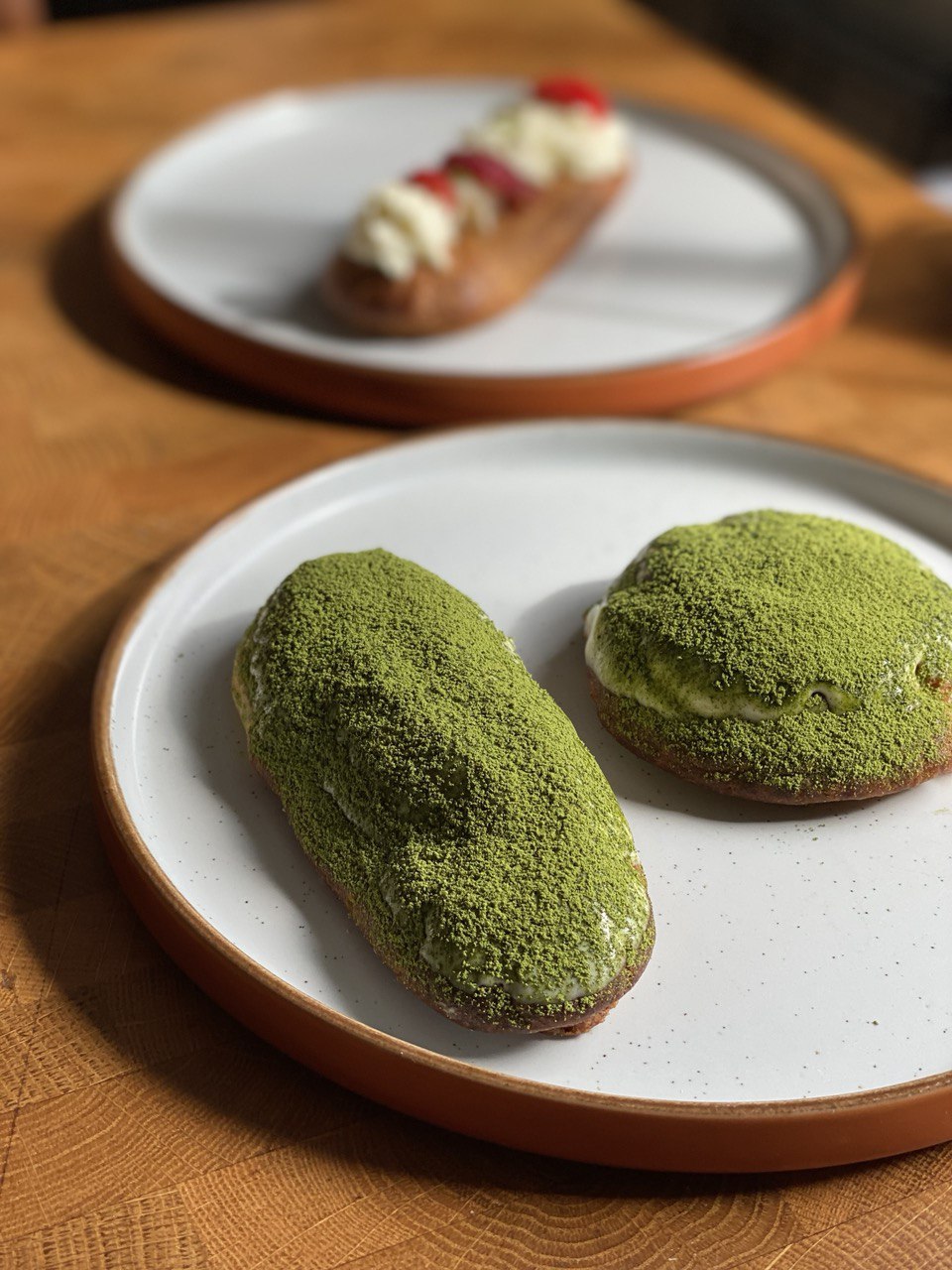
That's almost a classic pairing, and frankly a great one. I used up some leftover dough to make a weirdly shaped eclair too, but don't regret it.
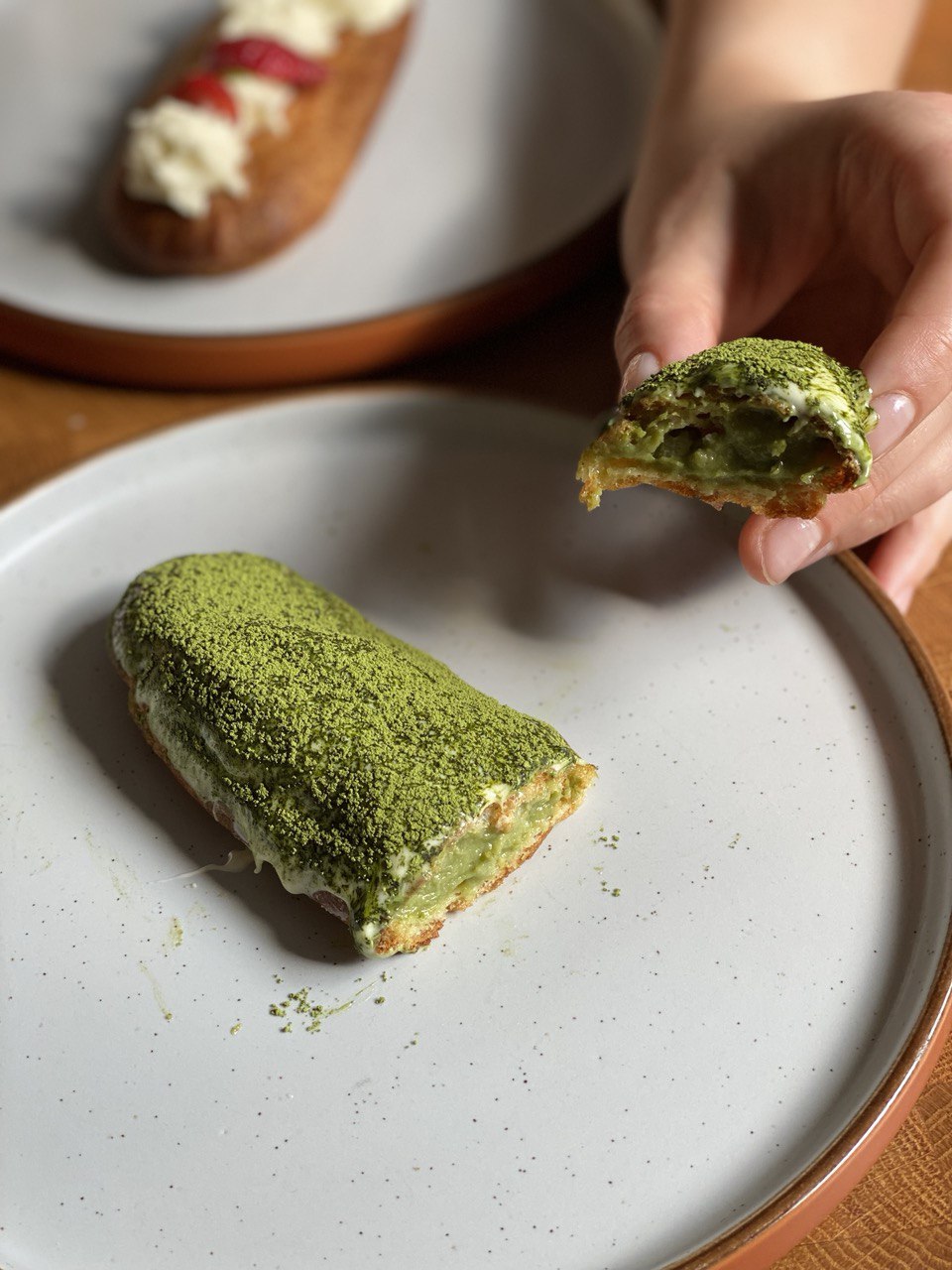
And last but not least, a Tiramisu eclair. It has a creme akin to the one you would expect from a tiramisu, but with more texture to it, and then a Savoiardi biscuit soaked in coffee and rum on top.
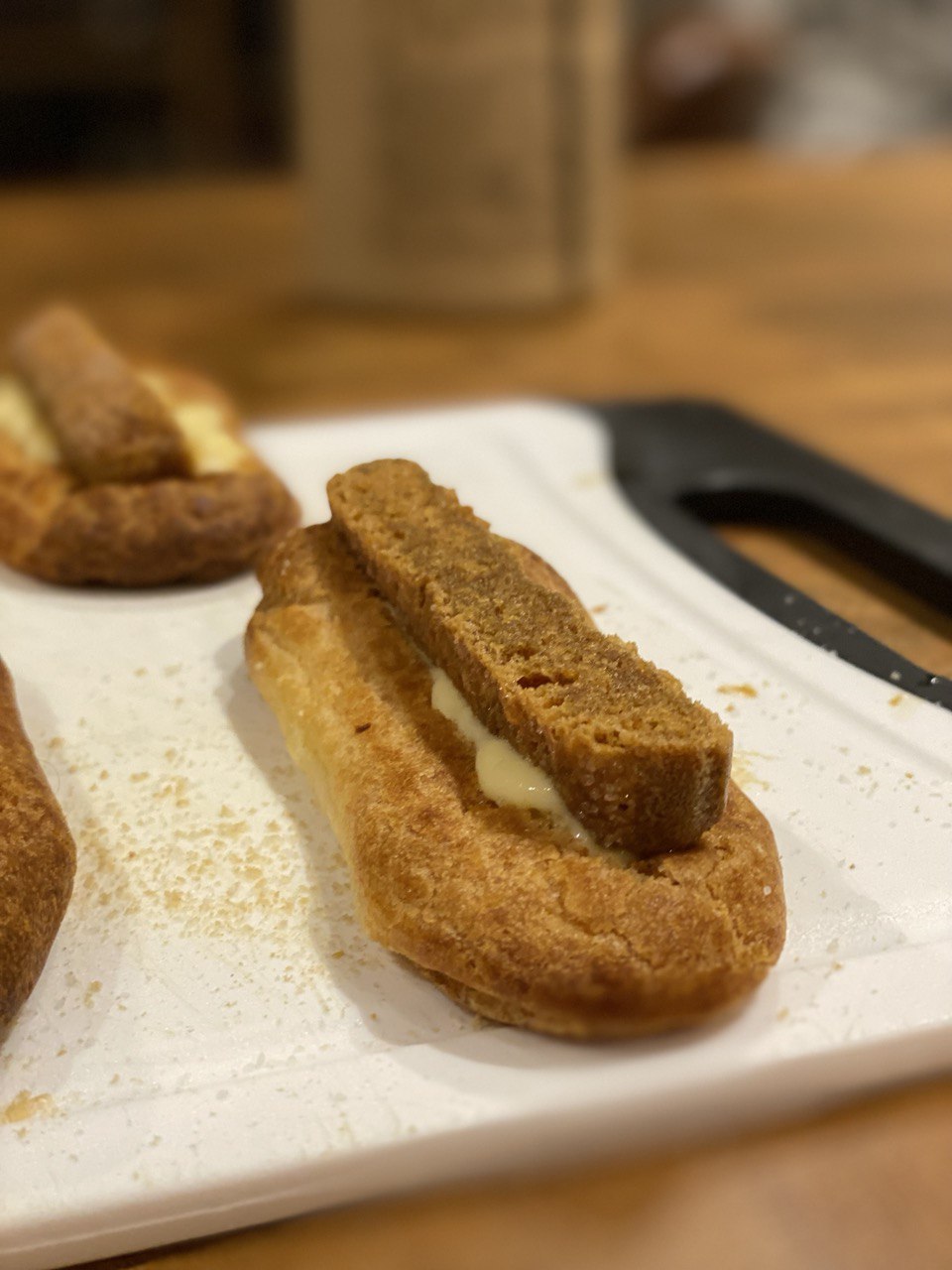
Once the biscuit got soft enough, it was evened out with the surface and covered with more cream and some cacao powder.
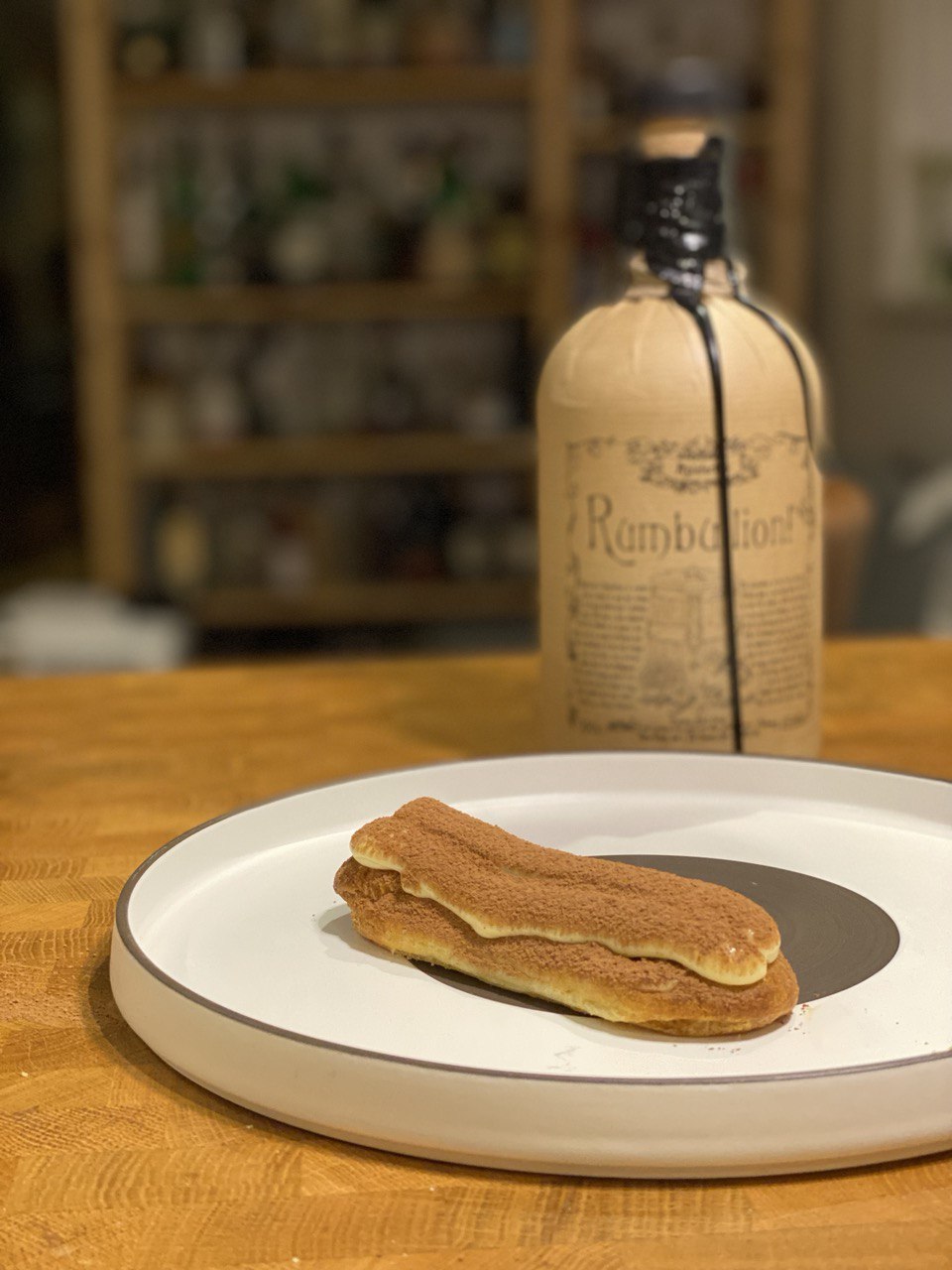
I also had some fun plating jacket potatoes with surimi and cheese aioli:
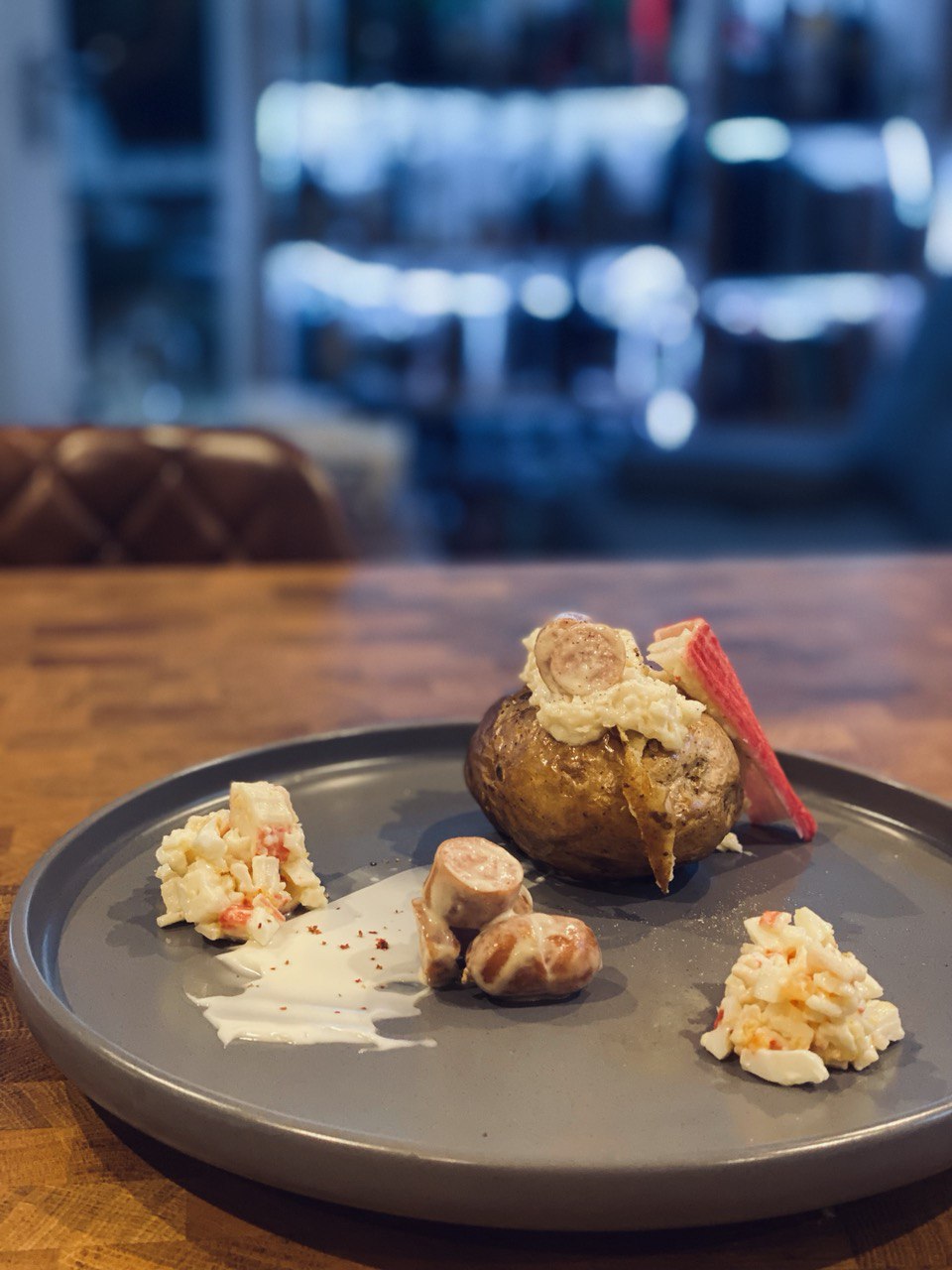
That's pretty much fast food from my uni years, but the serving is three times smaller.
Things I enjoyed reading ¶
1. Eleven Madison Park Isn’t Ready to Be a World-Class Vegan Restaurant by Ryan Sutton ¶
I respect Daniel Humm a lot.
I went to his restaurants, cooked his desserts, his appetizers, and reviewed his books.
However, I was among many disappointed by EMP's decision to stop serving meat, even though I tried some of the dishes from the vegan menu "destined to change the world". This take is as honest as it could be:
Matters of taste are subjective, but here’s my take: The dehydrated, rehydrated, smoked, and baked beet tastes pretty much like a beet. Staffers dress the root vegetable tableside with a veil of fermented, grilled, and pickled lettuces, then finish it with grated horseradish and a vegan bordelaise of sorts. The various cooking techniques impart a whisper of chew on the outside while the interior is faintly gelatinous, but otherwise, this isn’t so much fine dining or smart manipulation as it is something that fills you up with sugar. The sauce gives off a hint of garlic, but lacks the round, lip-smacking texture of a preparation laced with marrow and demi-glace. The beet is the vegetarian equivalent of filet mignon at a mediocre wedding; it fills you up without too much complexity. It’s fine.
Daniel is a great chef, but seems like that's not enough to turn the game upside down, even when a dinner for two costs like a new iPhone.
2. How doctors die. It’s not like the rest of us, but it should be by Ken Murray ¶
This is an important topic, and yet almost no one talks about it. Many ways to maintain life are worse then cutting it short, even if too early, and I err on the side of the author: dying with dignity is way better than living in pain (unless singularity is close and everyone would be cured).
Torch was no doctor, but he knew he wanted a life of quality, not just quantity. Don’t most of us? If there is a state of the art of end-of-life care, it is this: death with dignity. As for me, my physician has my choices. They were easy to make, as they are for most physicians. There will be no heroics, and I will go gentle into that good night. Like my mentor Charlie. Like my cousin Torch. Like my fellow doctors.
One thing anyone can do is to talk with their GP about pros and cons of No-CPR forms, and then make a decision – it can always be reverted if needed.
3. Interview with Sebastiaan de With by @theloversmag ¶
There are two apps that push my phone's capabilities to its boundaries (even though I am usually too lazy to use them), and they are made by the same company -- this is the interview with their founder.
Copy stuff! I honestly did nothing more than copy the work of artists I admired, whether that was in my young years of making weird Photoshop-stoner-art to being fascinated with icon and interface design. To get a great idea of how things are made and what the artists were thinking as they made it, you can go through their process by… retracing their steps! Once your techniques are better thanks to that, you can introduce all your own ideas, and they’ll flow readily through your now-competent fingers.
Musicians always learn by playing existing songs. For some reason, in visual design, we are expected to just produce tons of original content out of nowhere. It’s not a productive attitude: to learn the most, you should study work that really resonates with you and absorb it by trying to reproduce it. No shame in that!
This is a very good point. Somehow we are always taught that copying is not healthy, and won't help us to become better – and yet only by copying we can build on top of mistakes already learnt.
4. Facebook on your face by @alexeheath ¶
Facebook and Ray-Ban are starting sales of their smart glassess. These glasses are not AR yet, but they actually look the way I'd expect sunglasses to look like, but can also make photos and record videos.
If AR glasses do eventually become as ubiquitous as mobile phones, traditional eyewear companies like Luxottica won’t want to be caught flat-footed, according to Christopher Grayson, an AR and smart glasses analyst who has closely studied the luxury eyewear market. “You don’t want to be the taxicab industry when Uber shows up.”
Putting aside the fact that they will be plugged into Facebook's ecosystem (and I can't use Facebook without a smirk as it still looks like Internet in 2006), this is a very welcome step towards more and more wearable devices.
I am very bullish on all things AR, and this is something I'd love to work on in a decade, so this announcement is a very good sign, that's for sure.
5. My Life After Quitting Social Media by @durmonski ¶
And continuing on the topic of social media, this might be the best post-mortem about quitting them altogether I've read so far, partly because it is very honest, and partly because it is caring less about the common narrative of social media tracking our lives and selling our thoughts.
How My Life Changed After Quitting Social Media?
I become enlightened. I found my secret chakra that summoned my hidden spiritual animal and we all become one. I can describe it as an almost floating state.I’m kidding.
Nothing spiritually happened. But yes, it was liberating.
The idea that social media are bad because they sell their users to advertisement companies always felt hilarious to me. It's very hard to expect someone working for free, and value should be rewarded with something of a similar value.
Being able to use social media for whatever tickles one's fancy implies a payment in return, so complaining about it doesn't make sense. The author explains way more reasons behind quitting though, and it makes lots of sense.
6. Why the world still loves 1970s detective show Columbo by Shaun Curran ¶
I didn't remember the show until I looked up a trailer, but I've actually seen it before: at some point in my childhood, and then a decade later somewhere on the Internet. Stephen Fry pretty much sums up the way it worked:
"I think it's the pleasure of watching a cat go after a mouse," says Fry. "Seeing him work out the clever clues is so satisfying. And it puts us in a privileged position where we know what's happened. And although we should just say 'well of course we know, they've told us at the beginning', somehow we do feel superior. And we know that our champion Columbo is going to get his way. It's also the sheer pleasure that we know him and the villain doesn't. The villain underestimates him every time, and that moment of 'I may have underestimated you' is such a pleasing moment".
Most of the modern detective movies and series are different (with an exception of James Bond and Kingsman, probably): the villains they portray always overestimate the heroes, and then loose just because of bad luck or overengeneered traps.
Wonder how we get there.
7. How I accidentally deleted your Apple Shortcuts by @fransrosen ¶
I remember the day when it happened: Twitter exploded, my NFC tag routines broke, everything got back to normal a few days later.
The fact that it wasn't a system glitch or a rougue internal work is mind blowing, and kudos to the author for explaining a step by step story behind it (and scoring bounties for all of them).
I explained the situation and confirmed I understood the severity. I also explained the steps I took to avoid causing any service interruptions, since I knew that was against the Apple Security Bounty policy. I explained that creation of zones was indeed possible, but that I did not know if that confirmed that I could also delete zones.
If you think you have to deal with tough emails, imagine telling Apple's security team that you've just wiped out all Shortcuts from their platform, but you didn't meant it.
8. No laughing matter? What the Romans found funny by Orlando Gibbs ¶
From now on I am going to refer those complaining about British humour to the Roman empire. Despite having a well outlined structure to their jokes, they were even more peculiar than stories about Alan Partridge.
Plautus flexes his metacomical muscles more frequently and overtly than Terence does, but the Romans clearly had a soft spot for breaking the fourth wall in theatre, busting the artifice wide open by overtly commenting on it. Both Plautus’ and Terence’s plays include Prologues, in which the audience watching the play are directly addressed in a self-aware manner, much like a master of ceremonies. But it is within Plautus’ stories as well that characters talk about what they are doing as if they were directing, writing, or starring in a play.
There are more examples and categories to it though, so check out the full article if you fancy some proper laugh (can't promise it though).
9. Why Don’t the French Celebrate Lafayette? by @adamgopnik ¶
As I am neither a French nor an American, I had no idea about Lafayette until Hamilton the Musical, but now I do not understand why it is pretty much ignored as a historical figure. Seems like being a hero of two countries simultaneously doesn't do wonders for one's public image:
Lafayette’s dedication to the practical ideal of a constitutional monarchy for France met with repeated failure, however, partly because the republicans could never entirely accept the necessity of a figurehead king, and partly because the kings he tried to counsel could never really accept being figureheads. This put him in an awkward and, at times, a near-fatal position. A radical to the Royalists, a Royalist to the radicals, he was simply a realist in his relations with both.
Maybe these days it'd change though?
10. How to Survive the End of the Universe (In 7 Steps) by Don Foley and Michio Kaku ¶
It's not a surprise that our Universe will eventually end, one way or another. In the hypothetical scenario where we are around to observe it, is there anything we could do to escape that fate?
I got you covered.
If both Kerr rings and negative-energy wormholes prove unreliable, Guth’s inflation theory points the way to another, more difficult escape strategy: creating a baby universe.
As Guth points out, to create something resembling our universe would require “1089 photons, 1089 electrons, 1089 positrons, 1089 neutrinos, 1089 antineutrinos, 1079 protons, and 1079 neutrons.” However, Guth notes, the positive energy of this matter is almost but not entirely balanced out by the negative energy of gravity.
See, not that hard as you might have thought.
Things I didn't know last Tuesday ¶
1. Don't pre-rinse for dishwasher ¶
Apparently there is no need to rinse plates before putting them into a dishwasher. Even more, it's better not to rinse them as that changes the way the dishwasher operates.
Most dishwashers have inbuilt turbidity sensors that measure how much dirt is in the water from the first rinse cycle, so rinsed plates may fool the system. “If you pre-rinse everything, your dishwasher’s going to think that your plates are cleaner than they actually are, so it won’t wash as intensely and they might actually come out dirtier,” says Iredale. The food filter is there for a reason, he adds – simply remove and clean it once a month.
The rest of the article is pretty cool too, and points out a few more bits I didn't know about it.
2. Keyhole imaging technique ¶
Something straight from sci-fi or spy movies, but there is a technology that allows to expose the contents of a room by using a laser and a keyhole.
The keyhole imaging technique, developed by researchers at Stanford University’s Computational Imaging Lab, is so named because all that’s needed to see what’s inside a closed room is a tiny hole (such as a keyhole or a peephole) large enough to shine a laser beam through, creating a single dot of light on a wall inside. As with previous experiments, the laser light bounces off a wall, an object in the room, and then off the wall again, with countless photons eventually being reflected back through the hole and to the camera which utilizes a single-photon avalanche photodetector to measure the timing of their return.
I bet in a few decades they will manage to bump the resolution significantly, so instead of pointing out specific objects within the room one would be able to reproduce a text from a paper lying behind a closed door. Luckily by then we won't be using paper anymore.
3. Pasta Inflation ¶
Who'd think issues with durum harvest in Canada and frost in Russian could lead Italy to a past inflation?
Drought and heat continued to hurt the wheat harvest in July in Canada, the world’s biggest supplier of durum wheat, months after a harsh winter hit the Russian crop. Grain shipments from Western Canadian port terminal elevators tumbled 41% in the third week of August from a year-ago, according to a Quorum Corp.
Seems like companies are already stocking up the wheat, but as they can't store it for long periods it might not help.
4. Much greater than ¶
I completely forgot that >> actually has a meaning besides pointing to merge conflicts.
Sometimes you’ll see ≫, or more likely >> (two greater than symbols), as slang for “is much better than.” For example, someone might say “prototype >> powerpoint” to convey that a working prototype is much better than a PowerPoint pitch deck.
What's funny is how you can define it mathematically (the link explains that in a bit more details).
5. Weight loss to solve Global Warming ¶
If charging your phone less often or writing more efficient code is not inspiring anymore, there is another way to prevent global warming:
We estimated that a 10 kg weight loss of all obese and overweight people would result in a decrease of 49.560 Mt of CO2 per year, which would equal to 0.2% of the CO2 emitted globally in 2007. This reduction could help meet the CO2 emission reduction targets and unquestionably would be of a great benefit to the global health.
Personally I am a bit worried that 0.2% doesn't sound like much (and 10 kg sounds like a lot), but that's just a personal opinion scared of quitting eating at McDonald's.
6. Gas stations don’t make money from selling gas ¶
This one sounds quite counter-intuitive, but actually works the same way as for cinemas which make a big fraction of their income off selling pop-corn.
According to a study conducted by the National Association of Convenience Stores, 44% of gas station customers go inside. And among them, 1 in 3 ends up indulging in some kind of treat.
I can relate to that, actually. Growing up in a country where a travel between two cities usually involved a twelve hours long drive, gas stations were islands of fun and action among dull landscapes, so stopping at one never ended with just getting some gas.
7. Ribena fined for misleading vitamin C claims ¶
Two high school students found out that even though Ribena is advertising that "the blackcurrants in Ribena have four times the vitamin C of oranges", the actual drink has almost no traces of it, and an orange juice had three times more.
The students - now 17 - decided in mid-2004 to test the vitamin C levels of their favourite juices, including Ribena, Just Juice and Arano, for a school project.
They calculated that each 100ml of Ribena contained about 22mg of vitamin C.
The company was taken to court and fined more than 200k NZ$. Seems like I should've taken my school projects more seirously.
8. The most dangerous cosmetic surgery ¶
I won't be commenting on how this fact came to my attention, but something called "brazilian butt lift" (which is apparently different from "butt lift surgery") is the most dangerous cosmetic surgery:
This is why BBL surgeries have a higher mortality rate than any other cosmetic surgery – about one in 3,000 according to the ASPS. BBL recovery is slow and painful. “Most people need about 10-14 days of rest before going back to a full day of work,” says Dr Lee, adding that sitting and sleeping are the most difficult aspects of recovery. Patients can’t lay on their backs or sit directly on their butt for a minimum of three weeks.
Kind of explains why many Instagram models claim that this is a tough job.
9. Why do anime characters yell their names and attacks ¶
I don't watch anime (although I used to when I was a kid) and yet I do get exposed to it occasionally, and anime characters shouting out their names and attacks always confused me. Now the mystery is solved.
Most anime stories started as manga. Manga does a good job at showing action, but as a still-imge medium, it has limits. Sometimes panels become muddled when authors try to show a flurry of action. Because manga is typically black and white, characters can look similar to each other. To fix these issues, mangaka have their characters announce themselves and yell the names of their special attacks. In the flurry of action lines and camera angles, a reader can get confused and lose what is going on. By having announced signature attacks, the reader can have an anchor. This helps clarify who is attacking who.
So because manga is usually black and white, without lots of shouting readers get confused what's going on.
10. Leaves on the Line ¶
I don't remember hearing it personally, but easily believe that this excuse could be very common.
“Leaves on the line” is a term often repeated in the British media to the point of ridicule in the late Autumn and early winter, as passengers face disruption due to train services being delayed, subject to last-minute alterations or even cancelled.
And it's not like the leaves themselves are so hard to remove, it's that oils and tree sap turns them into a heavy sticky mess.
Book of the week ¶
Out of many countries I'd love to visit, Japan is somewhere at the top of my list, mainly for their cuisine.
I would probably pick sushi over pretty much anything else, with udon, yakitori, and savory takoyaki being close followers.
However I don't know much about the history of the cuisine. It's simple to trace back certain decisions in European dishes, it's even simpler to connect the dots and understand how certain dishes travelled through half of the globe.
It's way harder with Japan though, for many different reasons.
I am slowly going through Nancy Singleton Hachisu's Japan: The Cookbook and it fills the gaps, not only with recipes but also with the precursors to many of them.
The first prohibition against consuming meat was in the year 675 and was perhaps implemented to prevent endangering the small population of animals of burden (cows and horses) that provided support to the burgeoning agricultural industry.
Subsequent bans against killing living things were put in place by emperors and empresses who practiced Buddhism.
Shinto, Japan's native religion, discouraged eating meat because of the impurities that came from being in contact with blood (though there is no express Shinto taboo against killing sea creatures). Because fowl were sacred, no ban was required to prohibit killing and eating them. Even during meat bans, hunters still killed and ate deer and boar, though this was done quietly (and sometimes meat was dubbed "medicine" and consumed as such). So despite a long institutionalized policy of no meat eating, meat was eaten at times.Nonetheless, along with soybeans, fish (including whale and dolphin) became an important source of protein-which it remained for generations of Japanese for thousands of years
A few paragraphs, but they explain a lot (at least in my head). Also this book is what it is called, a cookbook, but comparing to the last dozen I shared it is way less demanding. Most of the ingredients are given only as a guidence, and the author actually encourages you to replace them with seasonal or local alternatives.
Which is a very Japanese approach, too.
Thank you and see you in a week! ¶
If you have any questions, or want to suggest a link for the next newsletter, please drop me a message on Twitter or reply to this email.
Cheers! 🍸